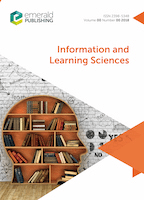
Information and Learning Sciences
Scope & Guideline
Fostering Global Collaboration in Learning Sciences
Introduction
Aims and Scopes
- Data Literacy and Education:
The journal emphasizes the importance of data literacy across various educational settings, exploring frameworks and practices that enhance students' understanding and use of data. - Technological Integration in Learning:
It investigates how emerging technologies, such as AI and virtual reality, can be integrated into educational practices to improve engagement and learning outcomes. - Social Media and Informal Learning:
Research in this area examines the role of social media in education, particularly how it influences learning experiences and community building among learners. - Critical Pedagogy and Equity:
The journal promotes discussions around critical pedagogy, focusing on equity, access, and the sociocultural dynamics of learning environments. - Collaborative Learning and Makerspaces:
There is a strong emphasis on collaborative learning practices, particularly within makerspaces, exploring how hands-on, participatory approaches can foster creativity and innovation. - Research Methodologies in Learning Sciences:
The journal encourages diverse methodological approaches, including qualitative, quantitative, and mixed methods, to address complex questions in learning sciences.
Trending and Emerging
- Generative AI and Education:
There is a significant increase in research exploring the implications of generative AI technologies, such as ChatGPT, for educational practices, highlighting both opportunities and challenges. - Data Visualization and Interpretation:
Emerging studies focus on data visualization as a critical skill, examining how learners can interpret and utilize data effectively in various contexts. - Social Media as Learning Tools:
Research increasingly investigates the educational potential of social media platforms, emphasizing their role in fostering informal learning and community engagement. - Equity and Inclusion in Learning:
There is a growing focus on equity and inclusion in educational research, with papers addressing how diverse learners can be supported in accessing and benefiting from educational resources. - Interdisciplinary Approaches to Learning:
The journal is seeing a rise in interdisciplinary studies that combine insights from various fields, such as technology, sociology, and psychology, to address complex educational issues.
Declining or Waning
- Traditional Learning Theories:
There appears to be a decreasing focus on traditional learning theories in favor of more contemporary approaches that integrate technology and social contexts. - Static Assessment Methods:
Research centered on static or standardized assessment methods is less prevalent, as there is a shift towards dynamic, formative assessments that reflect real-world learning. - Narrow Definitions of Literacy:
The journal's publication frequency for papers focused solely on narrow definitions of literacy has diminished, indicating a broader understanding of literacy in various contexts. - Passive Learning Environments:
There is a noticeable decline in studies that promote passive learning environments, as the focus shifts towards active, participatory learning experiences. - Isolation in Learning Practices:
Themes related to isolated or individualistic learning practices are becoming less common, reflecting a growing understanding of the importance of collaboration and community in learning.
Similar Journals

DESIDOC Journal of Library & Information Technology
Connecting Global Scholars in Library and Information ScienceDESIDOC Journal of Library & Information Technology, published by the Defence Scientific Information Documentation Centre, is a pivotal scholarly platform in the realm of Library and Information Sciences. The journal, indexed with ISSN 0974-0643 and E-ISSN 0976-4658, has established its reputation with a commendable Q3 category ranking in the latest Scopus quartiles and a notable rank of 113 out of 280 in its field, placing it in the 59th percentile. Engaging a global audience, it disseminates high-quality research insights aimed at advancing the practices and technologies within library and information management. Operating within a converged timeframe from 2012 to 2024, the journal is committed to fostering robust discussions surrounding contemporary issues in the field, making it an invaluable resource for researchers, professionals, and students alike. While currently not offering open access, its content is accessible through institutional subscriptions, reinforcing its significance in the academic community of India and beyond.

INFORMATION TECHNOLOGY AND LIBRARIES
Transforming Library Practices with Innovative Tech Solutions.INFORMATION TECHNOLOGY AND LIBRARIES, published by the American Library Association, stands as a crucial resource in the ever-evolving intersection of information technology and library sciences. With an ISSN of 0730-9295 and an E-ISSN of 2163-5226, this open access journal has been dedicated to fostering the dissemination of innovative research since its inception in 1971. Currently enjoying a Q2 ranking in both Information Systems and Library and Information Sciences, it is well-regarded within the scholarly community, reflecting its commitment to high-quality research outputs. The journal's diversified content scope—and a robust ranking of #80 out of 280 in the Library and Information Sciences category on Scopus—positions it as a pivotal platform for researchers, practitioners, and students alike. With the journals' emphasis on bridging technological advancements and library practices, it remains an essential tool for anyone looking to stay informed and engaged in these dynamic fields.
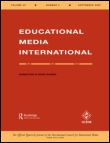
Educational Media International
Unveiling the future of learning through media exploration.Educational Media International, published by Routledge Journals, Taylor & Francis Ltd, is a premier journal in the interdisciplinary fields of Communication and Education, with a commendable Q2 ranking in both categories as of 2023. Established in 1978, this journal serves as a significant platform for the dissemination of innovative research that explores the evolving intersection of media technologies and educational practices. With an emphasis on both theoretical and practical applications, it addresses crucial topics such as digital learning environments, multimedia educational resources, and the impact of social media on education, making it an essential resource for researchers, professionals, and students alike. Located in the United Kingdom, Educational Media International not only contributes to the academic discourse but also reflects global trends and challenges in education, fostering a deeper understanding of the vital role media plays in shaping learning experiences worldwide.
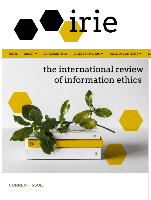
International Review of Information Ethics
Pioneering Ethical Insights for a Technologically Driven WorldThe International Review of Information Ethics, with the ISSN 1614-1687, is a critical platform dedicated to the exploration and discourse surrounding the ethical dimensions of information in the digital age. Published by the International Center for Information Ethics, this journal seeks to address the challenges and opportunities presented by technological advancements in information dissemination, data privacy, and digital citizenship. While the journal operates on an open-access model, it ensures the dissemination of high-quality research that serves as a valuable resource for researchers, academics, professionals, and students alike. Situated in Karlsruhe, Germany, the editorial team, led by Editor-in-Chief Rafael Capurro, invites contributions that engage with contemporary ethical issues, fostering a global dialogue that is vital for the ethical stewardship of information technology. By promoting rigorous scholarship and diverse perspectives, the International Review of Information Ethics aims to influence policy and practice in the ever-evolving landscape of information ethics.
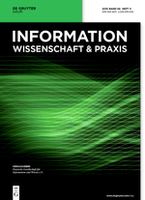
INFORMATION-WISSENSCHAFT UND PRAXIS
Connecting Researchers and Practitioners in the Digital Era.INFORMATION-WISSENSCHAFT UND PRAXIS is a prominent academic journal dedicated to advancing the fields of Information Systems and Library and Information Sciences. Published by Walter de Gruyter GmbH in Germany, this journal serves as a crucial platform for researchers, professionals, and students to publish and access cutting-edge findings and discussions from the intersection of information science and practical applications. With an ISSN of 1434-4653 and E-ISSN of 1619-4292, it has maintained a steady course since its inception in 1997 and will continue to thrive through 2024. While currently categorized in the Q4 quartile of pertinent fields, it provides value by soliciting diverse perspectives and innovative research, albeit ranking within the lower percentiles in prominent databases such as Scopus. The journal's commitment to fostering discourse in the critical issues of information management and its impact on society is essential in this rapidly evolving digital era. Though not an open-access journal, the insights gleaned from its pages are vital for those invested in the future of information science. For interested contributors and readers, INFORMATION-WISSENSCHAFT UND PRAXIS stands as a beacon for ongoing research and practical enlightenment in its domain.
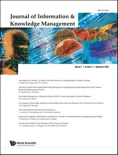
Journal of Information & Knowledge Management
Advancing the Frontiers of Information ScienceThe Journal of Information & Knowledge Management (ISSN: 0219-6492, E-ISSN: 1793-6926), published by World Scientific Publishing Co. Pte Ltd, is a leading academic journal dedicated to advancing the fields of Library and Information Sciences, Computer Networks and Communications, and Computer Science Applications. With an impressive convergence of research from 2002 to 2024, the journal holds a respected position within its categories, ranking in Q3 for Computer Networks and Communications and Computer Science Applications, and Q2 for Library and Information Sciences as of 2023. This publication serves as a vital resource for those involved in the exploration and development of information management strategies and technologies, addressing current challenges and innovations. Researchers, professionals, and students alike will find invaluable insights and potential collaborations through its content, which reflects a commitment to high-quality scholarship as evidenced by its Scopus rankings. The journal's emphasis on fostering academic discourse makes it an essential platform for disseminating knowledge in this rapidly evolving domain.

Acta Informatica Pragensia
Connecting Scholars: A Hub for Interdisciplinary Research Excellence.Acta Informatica Pragensia is a prominent open access journal published by UNIV ECONOMICS, PRAGUE, which has been dedicated to advancing the fields of Computer Science Applications, Information Systems, Library and Information Sciences, and Management Information Systems since its inception in 2012. Situated in the beautiful Czech Republic, this journal aims to foster academic dialogue and disseminate high-quality research across these interdisciplinary domains. With an H-index indicating its growing impact, Acta Informatica Pragensia offers authors the opportunity to publish their findings in a Q4 ranked journal within significant categories according to the 2023 metrics, including a notable Q3 in Library and Information Sciences. Its placement in the Scopus ranks also showcases its relevance in the field, including a solid position in the 58th percentile for Library and Information Sciences. The journal's open access model ensures that research is widely available, empowering students, researchers, and professionals to engage with the latest innovations and trends. Submissions from diverse backgrounds are welcomed, making it an essential resource for those seeking to contribute to the evolution of information technology and systems.

Publications
Catalyzing Discoveries for a Global AudiencePublications is a leading international journal published by MDPI, based in Switzerland, that has been at the forefront of scholarly communication since its inception in 2013. As an Open Access journal, it aims to disseminate high-quality research across multiple disciplines, notably in Business and International Management, Communication, Computer Science Applications, Library and Information Sciences, and Media Technology. Its impressive standing is reflected in its 2023 Scopus ranks, with top quartile positions across various fields, including a Q1 ranking in Library and Information Sciences and Media Technology. With a commitment to promoting innovation and collaboration, Publications serves as an essential platform for researchers, professionals, and students alike, allowing them to engage with the latest findings and discourse. The journal's strategic focus on accessibility ensures that knowledge is available to a global audience, fostering an environment conducive to academic and practical advancements. The E-ISSN 2304-6775 identifies its distinct digital presence, making it an invaluable resource for anyone passionate about cutting-edge research.
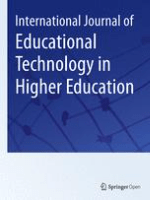
International Journal of Educational Technology in Higher Education
Shaping the future of education through technology.The International Journal of Educational Technology in Higher Education, published by Springer, stands as a pivotal platform for the dissemination of innovative research and findings in the field of educational technology. Since its inception in 2016, this open-access journal has been dedicated to enhancing the intersection of technology and education, providing scholars and practitioners with cutting-edge insights that shape contemporary educational practices. With a robust ISSN of 2365-9440, the journal has garnered impressive accolades, ranking in the top quartile (Q1) in both Computer Science Applications and Education disciplines as of 2023. Furthermore, it holds an esteemed position within the Scopus rankings, occupying rank #6 out of 1543 in Social Sciences Education, and #20 out of 817 in Computer Science Applications, highlighting its influential reach and scholarly impact. The journal especially focuses on how emerging technologies are transforming higher education, fostering a collaborative approach amongst researchers, educators, and professionals. By making its content openly accessible, it aims to bridge knowledge gaps and support the advancement of effective educational practices worldwide.

TechTrends
Exploring the Intersection of Education and TechnologyTechTrends, published by SPRINGER INT PUBL AG, is a leading journal in the field of technology in education and computer science applications. With an ISSN of 8756-3894 and E-ISSN 1559-7075, this prestigious journal has been contributing to the scholarly community since its inception in 1982, covering a wide range of relevant topics that intersect technology and educational practices. TechTrends is recognized for its high impact, evidenced by its Q1 ranking in Education and Q2 in Computer Science Applications for 2023. It occupies a significant place in academic discourse, ranked #217 out of 1543 in Social Sciences Education and #276 out of 817 in Computer Science. Through its commitment to advancing knowledge and best practices in technology-enhanced learning, TechTrends serves as a vital resource for researchers, educators, and technology professionals striving to integrate innovative technological solutions in educational settings. As an essential platform for the dissemination of groundbreaking research and scholarly articles, TechTrends continues to shape the future of technology in education.